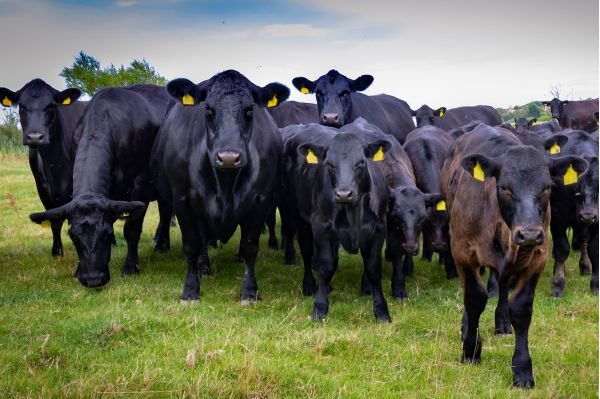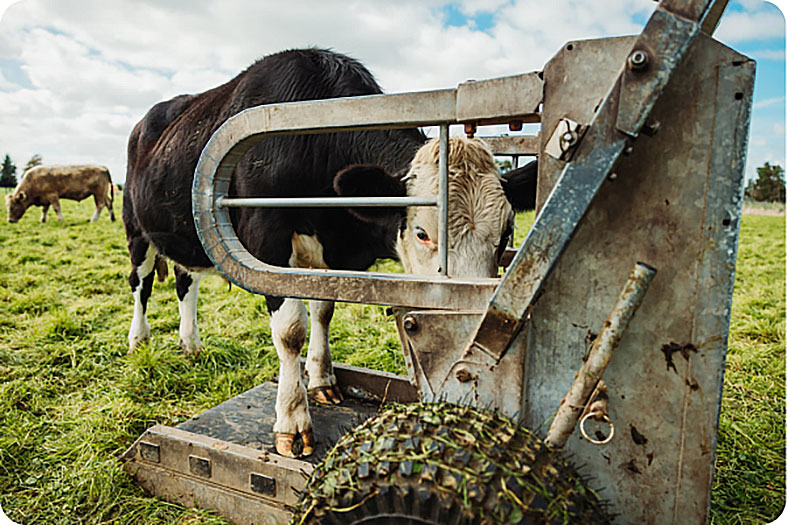Worth its weight

Problem-solving is the raison d’être for all tech companies and for StrongBó Agritech, there was one critical beef-farming problem that needed addressing. Micheál explains: “That was to enable beef farmers to understand the performance of their herds in real time. Before our technology became available, beef farmers needed to wait for months to get performance data because manual systems were not practical for regular use.”
This resulted in a lack of frequent, regular data, as manually weighing cattle – which requires handling animals in a crush – is a risky process, only done when absolutely necessary. StrongBó Agritech’s automatic system changed that. Micheál continues: “The automatic weighing system uses attractants like salt or molasses to get the animals to approach and stay on the weighing platform. The system takes thousands of weight readings and processes the data locally, ensuring highly accurate weight data.”
Measuring and collating accurate weight data provides essential information for farmers, underpinning present and future decisions. StrongBó Agritech, Micheál explains, homed in on five areas where this information would make an impact.
Knowing the weight of a group of beef cattle: Some farmers don’t even use manual systems and instead guess the weight of their livestock. Some farmers can be close with their weight estimates, but that is rare and often leads to inaccuracies.
Average daily gain (ADG): This metric, which indicates how much weight an animal gains per day, is crucial for farmers to know if they are making a profit. With the best data available to farmers, this information can take weeks and even months to determine accurately. By then, significant gains have been lost.
Weighing is time consuming and dangerous: Manually weighing cattle is a burdensome and risky task, requiring significant time and posing dangers to both farmers and animals.
Selling stock at the correct time: When animals reach a certain weight or start to drop in performance (ADG), StrongBó Agritech’s system can detect this within a few days. This allows farmers to decide which animals to send for slaughter and which to keep for further feeding, leading to additional weight gain and higher sale value.
Sustainability: The Auto-Weigher contributes to more sustainable farming by optimising resource use. Accurate weight data helps farmers manage feed more efficiently, reducing waste and improving overall herd health.
From concept to creation
StrongBó Agritech was founded by Ivan Wahlrab and Micheál McInerney to tackle a growing need for innovation in the beef sector, where extensive farming operations, harsh climates, and large animals can hinder the frequency at which farmers can assess their daily output. Micheál, from a beef-farming background in south Galway, identified the problem of beef-performance metrics on his family farm, which led to the concept of an automatic weigher and the creation, in 2015, of a prototype. The business was officially incorporated in 2019, after several years of working with early-stage customers and researchers. In early 2021, the company announced a partnership with Dr Marty Metzger in Ontario, Canada, where he had been developing similar technologies for the beef industry there. In 2023, the company finally commercialised its design. After securing seed investment in 2023, its team quickly expanded and a strong mix of commercial leaders and engineers were hired to help up-scale the business. The team combines agricultural knowledge and technological expertise. Currently, there are four full-time employees and three part-time contractors.
Micheál elaborates:. “Once the device is placed within the herd, information can be obtained after just a few hours. After two days, almost all animals in the herd are weighed. This gives a quick and accurate group average, which can be tracked for the benefit of feed and pasture management, optimal timing of sale, and herd valuation.”
Being able to track ADG enables farmers to make decisions based on live data and not information from two or three months ago, and it helps them to identify underperforming animals quickly so they can decide which animals to sell or keep for further feeding.
Micheál adds: “Tying in with that, it allows beef finishers to evaluate individuals on a daily basis and to determine if it is time for slaughter. Every animal stops gaining weight and knowing when this occurs, will save you massively.
“The system is 100 per cent autonomous, and works for years with no maintenance. This means no need for a manual system, and no need to risk running animals through the crush,” he says. And it ticks the sustainability box also, he explains: “Unlike other trade-offs with economic development and the subsequent impact on the environment, beef efficiency is very different. Improvements in this sector have a direct impact on reductions to greenhouse gas (GHG) emissions.

The Auto Weigher – how it works
With the animal: It uses an automatic weighing platform that attracts cattle with salt or molasses. Once the animals step onto the platform, the system takes thousands of weight readings and processes the data locally.
The technical specifications: It is built with a heavy gauge galvanised steel frame, stainless steel load cells, and UV- and chemical-resistant electronics. The system can send data via Bluetooth, cellular, or satellite, ensuring connectivity even in remote areas. It also features an app (available in the App Store and Google Play) along with a web app for PC access allowing farmers to view and manage their herd data securely from anywhere. The data is easily extracted and fully secure on our servers.
With the farmer: Farmers can access real-time data through an easy-to-use interface, allowing them to monitor ADG, identify underperforming animals, and make informed decisions about feeding and selling. The system reduces the need for manual weighing, saving time and minimising risks. The towing ability of the Auto Weigher is designed for convenience, allowing farmers to easily move it from paddock to paddock or field to field, ensuring continuous data collection and no gaps in monitoring.
To achieve sustainability and environmental benefits: It contributes to more sustainable farming by optimising resource use. Accurate weight data helps farmers manage feed more efficiently, reducing waste and improving overall herd health.
Global appeal
In the almost 10 years since its conception, StrongBó Agritech has made its mark, globally. With the Auto Weigher’s widespread appeal, the company has made significant inroads in the North American and European markets, where automatic weighing has been well received by large-scale beef-farming operations. “We are also exploring opportunities in other regions with robust livestock industries and a high demand for innovative agricultural solutions,” says Micheál. The US and Canada are prime locations in this regard.
The company’s partnership with Gallagher Animal Management has been key to reaching markets abroad. “Gallagher has extensive access to a global market of beef producers and has served these customers for almost a century. Our small team fits in extremely well with Gallagher, as our agility allows us to make improvements to existing products quickly or create solutions to completely new problems.”
POSITIVE reception
The device been positively received by farmers who ‘appreciate the ease of use, accuracy, and the actionable insights provided by the system’ according to Micheál. “Many have reported significant improvements in herd management, increased productivity, and reduced operational costs,” he says. “Farmers particularly value the real-time data and the ability to make informed decisions without the risks and hassles associated with manual weighing.”
But the journey so far has not been without challenges, he admits: “Some farmers initially expressed scepticism about transitioning from traditional methods to an automated system. Additionally, integrating new technology into existing farm operations required a learning curve. However, once farmers saw the benefits and ease of use, their adoption and satisfaction levels increased significantly.
“Despite the challenges, the strong adoption rate and positive customer feedback have encouraged us to continue innovating and improving our offerings to meet the needs of farmers worldwide,” says Micheál.
Additionally, the environment in which the technology operates is one of the harshest in the world, with machines experiencing up to 23 hours of use per day in large North American feedlots. The challenges are comounded by things like snow, ice, frozen manure, and the physical stresses from 800kg animals," says Micheál.
He adds: “Additionally, the electronics need to function in this environment with low power consumption and reliable cloud connectivity, whether in an indoor barn in Galway or Ontario or remote locations in New Zealand.”
Exciting projects
StrongBó Agritech now has several exciting projects in the pipeline. Micheál elaborates: “We are focused on developing new technologies to provide even more detailed and accurate data on livestock health and performance. Additionally, we are working on integrating advanced AI capabilities to offer predictive analytics, which will help farmers make proactive decisions about herd management.”
The company is also exploring the application of its technology to other types of livestock beyond beef cattle, such as sheep and pigs, to broaden its market reach. “Our goal is to create a comprehensive suite of smart-farming solutions that cover all aspects of agricultural management, from health monitoring to feeding optimisation. Our commitment to sustainability remains at the forefront of our development efforts. We are continually looking for ways to enhance the environmental benefits of our products, ensuring that our technology not only improves farm productivity but also contributes to more sustainable and eco-friendly agricultural practices.”
Having a Fieldays
The company recently travelled to the largest agricultural event in the southern hemisphere, Fieldays in New Zealand where they had the opportunity to showcase the Auto-Weigher to a diverse audience. There, they received positive feedback from farmers and industry experts, says Micheál.
“As a result of our participation, we have established valuable connections with potential customers and partners. The exposure and recognition at Fieldays have opened up new business opportunities and collaborations in the region, further validating the global relevance and impact of our solutions.”
Innovation is key
Agriculture has always evolved and innovated but it is going through a very exciting period right now where serious challenges are being met with serious solutions. Micheál agrees but says that the beef sector has not seen the same level of change as that of other sectors. “Dairy, pork and poultry have been transformed with new tech and processes but despite genetic improvements, the beef industry remains somewhat unchanged when compared to 50 years ago.
“We believe that innovation is the key to unlocking the full potential of farming. Technologies such as Internet of Things, AI, and advanced data analytics are enabling farmers to make more informed decisions, optimise resource use, and improve the health and productivity of their livestock. These innovations are not just about increasing efficiency; they are about creating a more resilient and sustainable agricultural system."
Michéal continues: “The integration of sustainable practices with technological advancements is particularly exciting. By reducing waste, improving animal welfare, and minimising environmental impact, we can create a farming ecosystem that supports both the farmer and the planet. The development of solar-powered systems, like our Auto-Weigher, is a prime example of how technology can contribute to sustainability.
“Innovation in farming, more than in other industries, requires a significant practical component and unwavering reliability. Beef producers have limited capacity to adopt cumbersome technology, and tight margins can greatly affect early adopters. We recognise this as a major barrier to tech adoption. This is why our partnership with Gallagher is so beneficial. Gallagher’s reputation and experience help break down entry barriers. Overall, the current wave of innovation in agriculture is setting the stage for a more productive, sustainable, and resilient future. We are proud to be part of this movement and are committed to continuing our efforts to drive positive change in the industr,” says Michéal.





